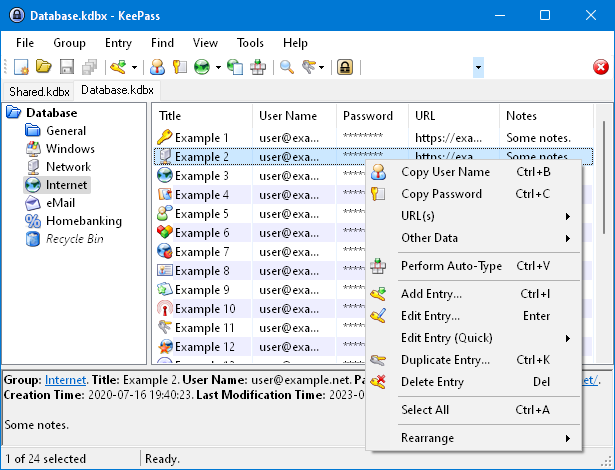132 private links
Well, if you found this page and are interessed in pass, you must already have your reasons to look into password managers. For me, it's a basic concept: Use password only once. Don't (ever) reuse passwords or passphrases for other services. If one service gets compromised, you won't automatically have to worry about your other services. This makes remembering passwords a bitch, especially if you don't iterate through numbers of your favorite, easy-to-guess, passwords. Speaking of which, yes, there are tools out there, that can generate very good dictionaries based on a bit of social engineering. So you really should use generated passwords.
Many of us use password managers to securely store our many unique passwords. A critical part of a password manager is the master password. This password protects all others, and in that way, it is a risk. Anyone who has it can pretend to be you… anywhere! Naturally, you keep your master password hard to guess, commit it to memory, and do all the other things you are supposed to do.
Hashicorp Vault hogs the limelight as cost-effective powerful KMS solutions are hidden in plain sight. Chris McGrath explores the underrated Mozilla SOPS.
This HN thread contains several tips and hints regarding methods, approaches and tools to share secrets across people and systems.
KeePass is a free open source password manager. Passwords can be stored in an encrypted database, which can be unlocked with one master key.

Bitwarden is a free and open source password management solution for individuals, teams, and business organizations.
Easy and safe way for individuals, teams, and business organizations to store, share, and sync sensitive data.
A command line interface (interactive shell) to work with KeePass 1.x or 2.x database files.

gopass is a rewrite of the pass password manager in Go with the aim of making it cross-platform and adding additional features. The target audience are professional developers and sysadmins (and especially teams of those) who are well versed with a command line interface.
The team password manager.
I am not going to discuss why you need strong passwords. It is an open secret that strong passwords keep you relatively safer.
Generating strong passwords is something you can do on your own but putting all the combination of lower and upper cases, numbers, symbols can be a tiresome work.
But you need not worry. Linux has got you covered. We’ll see 5 best password generators for Linux that will ease the task for you.
Password management belongs to the command line, deep into the Unix heartland, the shell. Titan is written in C and is available under the MIT license.
A robust and efficient password cracking tool that can help you recover lost passwords, audit password security, benchmark, or just figure out what data is stored in a hash.
Password management should be simple and follow Unix philosophy. With pass, each password lives inside of a gpg encrypted file whose filename is the title of the website or resource that requires the password. These encrypted files may be organized into meaningful folder hierarchies, copied from computer to computer, and, in general, manipulated using standard command line file management utilities.
Generate and store secure passwords. Everything is accessible only to you on our No Knowledge cloud, whether you're on your phone or at your desk. It's totally free!
Master Password is a different way of using passwords. Instead of the "know one password, save all others somewhere" way of managing passwords used by regular password managers, Master Password's motto is "know one password, generate all the others".
Encryptr is free and Open-Source password manager that is based on a very secure ‘Zero-Knowledge Crypton Framework‘. Zero-Knowledge system does not allow even a server to know what data is being sent and saved on the server by user. Encryptr saves all of your passwords, credit card data, PINs, or access codes, in the cloud with a simple and sleek user interface.
From the moment people started using passwords, it didn’t take long to realize how many people picked the very same passwords over and over. Even the way people misspell words is consistent. In fact, people are so predictable that most hackers make use of lists of common passwords just like these. To give you some insight into how predictable humans are, the following is a list of the 500 most common passwords.
